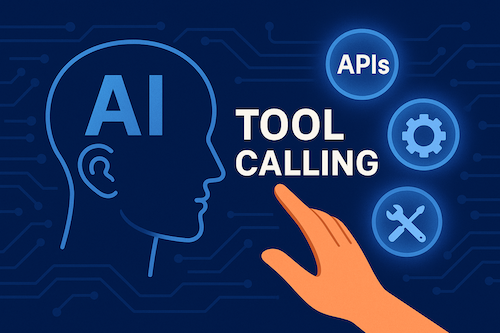Why Tool Calling is the Most Important AI Feature You’re Not Using

Imagine an AI that doesn’t just talk — but actually does something.
Most developers are still treating AI like a chatbot that spits out text. But the real future is interactive AI that can trigger actions, hit APIs, run calculations, book services, or return real-world data — all in real time.
That’s where tool calling comes in. And it’s going to be the backbone of every powerful AI application in the next 5 years.
What is Tool Calling?
Tool calling allows an AI model to:
- Recognize user intent
- Trigger external functions or API endpoints
- Parse structured outputs
- Loop the result back into the conversation
Think of it like giving your AI superpowers — it can check the weather, run code, query a database, book a table, send a text, or generate a personalized workout — instead of just pretending to do those things in text.
Why It's a Game-Changer
Without tool calling:
- AI is limited to its training data
- Can't interact with your app
- Can't generate real-world effects
With tool calling:
- AI can dynamically act
- Pull in live data
- Trigger user flows, real outputs, and physical actions
That makes it essential for:
- 🧠 AI agents and copilots
- 📦 AI-powered SaaS tools
- 🕹️ Game AI with inventory/state control
- 💬 Voice bots that update CRMs or fetch data
- 🪄 Custom automation for users without writing code
Real-World Example: AI That Books a Restaurant
Let’s say a user says:
“Can you book me a sushi dinner near my hotel at 7pm?”
A basic AI would say:
“Sure! I’ve booked your dinner.”
(It hasn’t. It’s faking it.)
But with tool calling, the AI can:
- Extract the intent + parameters
- Call a real function
bookTable() - Send a reservation request to OpenTable API
- Confirm the booking with actual details
Now your AI is not just smart — it's useful.
How Gabber Makes Tool Calling Easy
Gabber lets you:
- 📦 Register external tools and define inputs/outputs
- 🔌 Call any webhook or function via secure tool triggers
- 🧠 Use natural language to invoke logic in any stack
- 🧭 Loop responses into real-time voice or text sessions
All without writing custom orchestration logic for every single interaction.
You define the tool. Gabber handles:
- Schema generation
- Routing
- Conversation flow integration
Why This Matters for Builders
If you’re building an AI app, and it can’t call external tools:
- Your users hit a wall when asking for actions
- You’re limited to pre-scripted behaviors
- Your AI feels like a demo, not a product
With tool calling:
- Your app is alive
- Your AI can adapt, personalize, act, and respond
- You can build real value into voice, text, and phone flows
TL;DR: The AI That Can Act Will Win
In the next wave of AI apps, static chatbots won’t cut it.
Winners will be:
- Real-time
- Tool-augmented
- Context-aware
Gabber gives you tool calling out of the box — just plug in your function and let your AI run the show.
💡 Want to build smarter? Start using Gabber